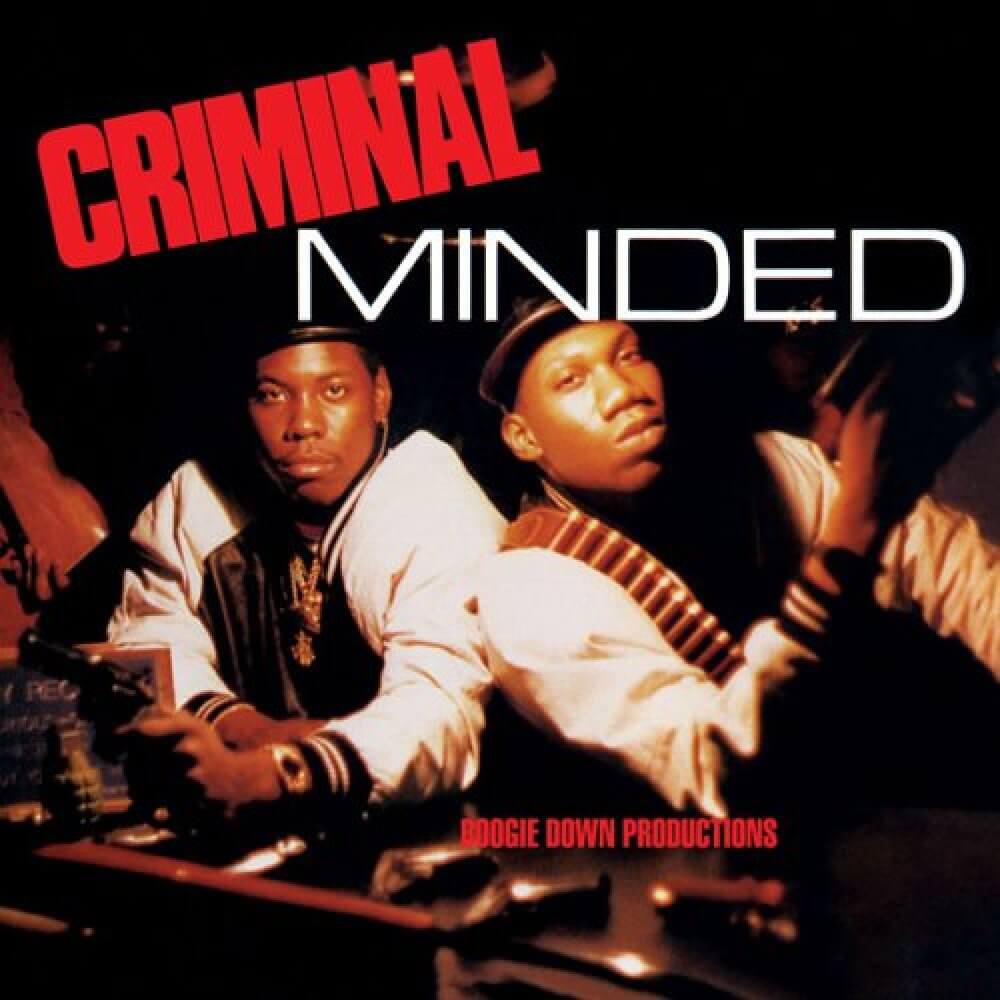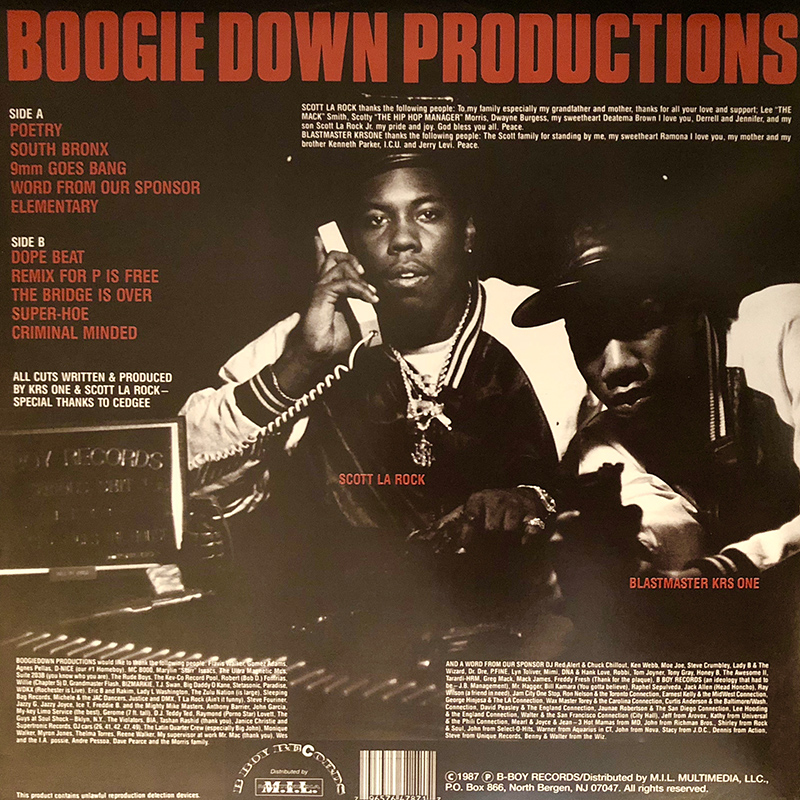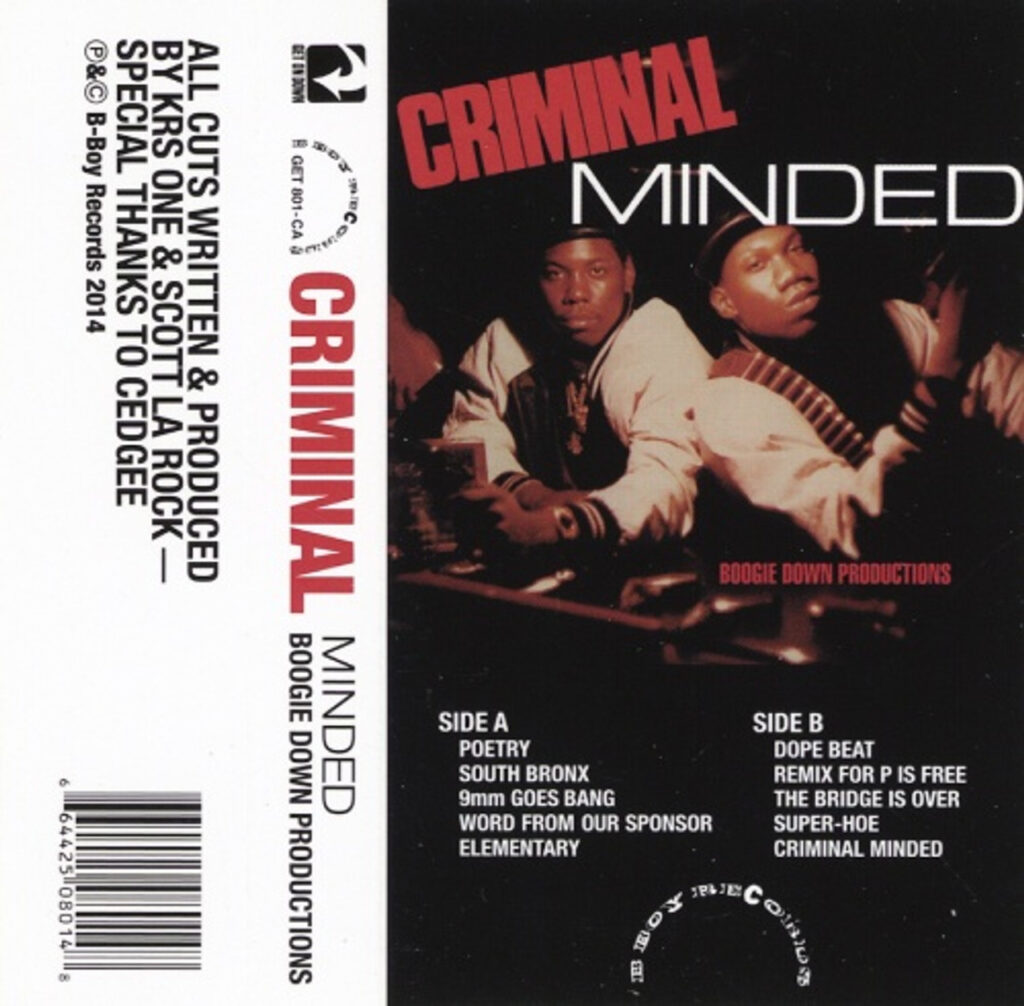
Boogie Down Productions emerged from the fertile ground of the Bronx in the mid-1980s, a product of the borough’s burgeoning Hip Hop scene. At the group’s inception, it was comprised of two key figures – Lawrence “Krisna” Parker, better known as KRS-One, and Scott “DJ Scott La Rock” Monroe Sterling. The two initially connected when KRS, then a young teenager living in a group home, crossed paths with La Rock, who was serving as his social worker.
Their shared passion for music and Hip Hop brought them together, and they soon began recording and performing as Boogie Down Productions. KRS-One’s formidable lyrical and intellectual talents, combined with La Rock’s deft production skills, laid the foundation for what would become one of the most influential and acclaimed Hip Hop albums of all time – Criminal Minded.
When Boogie Down Productions released their debut album in 1987, they laid the foundation for an entire subgenre of Hip Hop. As the title suggests, this album tackles the streetwise tales involving criminal acts – drugs, prostitution, and violence. But beyond the album’s gritty subject matter, Criminal Minded exhibited the raw power and unparalleled skill of the group’s driving force, KRS-One. The album’s production, largely handled by La Rock and an uncredited Ced-Gee of Ultramagnetic MCs, laid the blueprint for the “Boom Bap” sound that would come to define East Coast Hip Hop. Grounded in hard-hitting drums, soulful samples, and raw, unpolished energy, the beats provide the perfect canvas for KRS-One’s virtuosic rhyme displays.
One of the album’s most striking qualities is its consistency. There’s not a weak track to be found across the ten-song tracklist. From the opening salvo of “Poetry” – a lyrical clinic where KRS twists and contorts internal rhyme schemes in mesmerizing fashion – to the album-closing title track, Criminal Minded maintains an exceptional standard of quality. And the diversity within that quality is equally impressive.
Songs like “9mm Goes Bang” and “Remix for P Is Free” delve into the grim realities of urban life, painting vivid narratives of violence and the crack cocaine epidemic. KRS delivers these tales with an unsettling, almost singsong cadence, as if recounting these events with a detached matter-of-factness. But this approach never feels gratuitous or exploitative. There’s a palpable sense of authenticity to these tracks, a raw honesty that speaks to KRS’s own experiences growing up in the Bronx.
Throughout the album, KRS-One flaunts his astounding lyrical prowess. On “Word from Our Sponsor” and “Elementary,” he dispenses masterclasses in intricate rhyme patterns and dexterous flow, challenging his peers and elevating the art of MCing. The title track, in particular, finds KRS flexing his lyrical muscle over a hard-hitting beat built around Trouble Funk’s “Let’s Get Small” and Syl Johnson’s “Different Strokes.” His words are sharp, incisive, and unapologetically confident: “Criminal-minded, you’ve been blinded / Lookin’ for a style like mine, you can’t find it / They are the audience, I am the lyricist / Sometimes the suckas on the side gotta hear this”.
Of course, no discussion of Criminal Minded would be complete without addressing the album’s legendary diss tracks. “South Bronx” and “The Bridge is Over” ignited a rivalry with the Juice Crew and MC Shan, a beef that would become one of the most iconic in Hip Hop history. KRS-One’s scathing delivery, combined with the tracks’ infectious, dancehall-influenced energy, made these disses impossible to ignore. “The Bridge is Over,” in particular, stands as one of the most vicious and influential diss records ever committed to tape.
What’s most remarkable about Criminal Minded, though, is how it manages to balance the gritty street narratives with a genuine reverence for the foundations of Hip Hop culture. While the album may have been seen as a harbinger of the burgeoning “gangsta rap” movement, its true innovation lies in its sophistication. KRS-One and Boogie Down Productions weren’t just rapping about crime and violence – they were expanding rap’s thematic and lyrical boundaries.
This nuance is perhaps best exemplified on the album’s opening track, “Poetry.” Here, KRS pays homage to the art of lyricism, deconstructing traditional rhyme schemes and flow patterns to create something truly innovative. His ability to marry complex internal rhymes with a captivating, almost melodic delivery is a testament to his mastery of the microphone.
Other dancehall-inflected tracks, like “9mm Goes Bang” and the “Remix for P Is Free,” also showcase Boogie Down Productions’ reverence for the musical lineage that birthed Hip Hop. KRS-One’s Jamaican-influenced cadences and patois-laced vocals serve as a nod to the genre’s roots in reggae and dub. It’s a connection that would only become more pronounced as KRS-One’s role as “the Teacha” solidified in the years to come.
Tragically, Criminal Minded would be the only album that KRS-One and Scott La Rock would create together. Just months after the album’s release, La Rock was fatally shot in a senseless act of violence. His untimely passing cast a somber shadow over Boogie Down Productions’ legacy, but it also cemented Criminal Minded as a singular, irreplaceable work.
In the decades since its release, Criminal Minded has only grown in stature. KRS-One’s lyrical mastery, combined with Boogie Down Productions’ innovative production, created a template that countless artists have attempted to emulate, but few have been able to match.
Criminal Minded is Hip Hop in its purest, most essential form. It’s an album that demands to be heard, not just for its historical significance, but for the sheer power and artistry it contains. From the street-level narratives to the lyrical gymnastics, every element of this record comes together to form a cohesive and compelling whole. It’s a towering achievement that will continue to reverberate through the halls of Hip Hop history.

